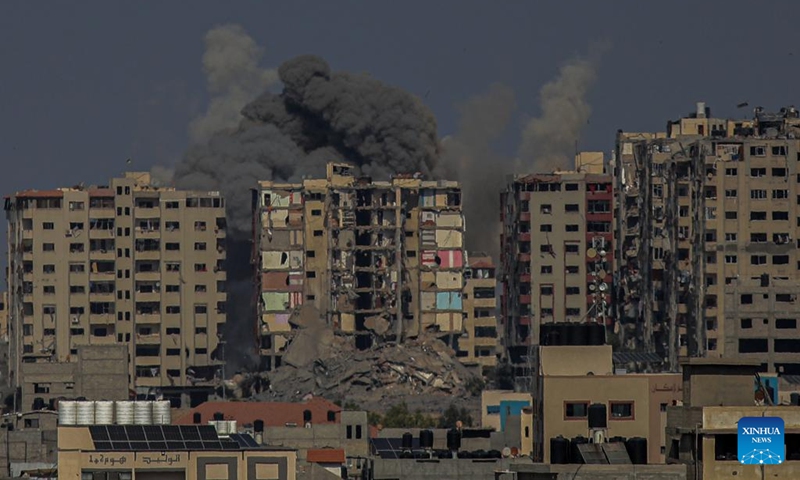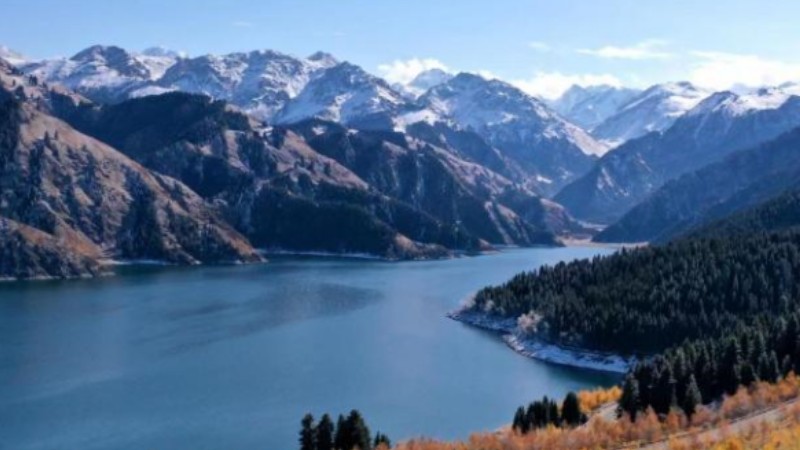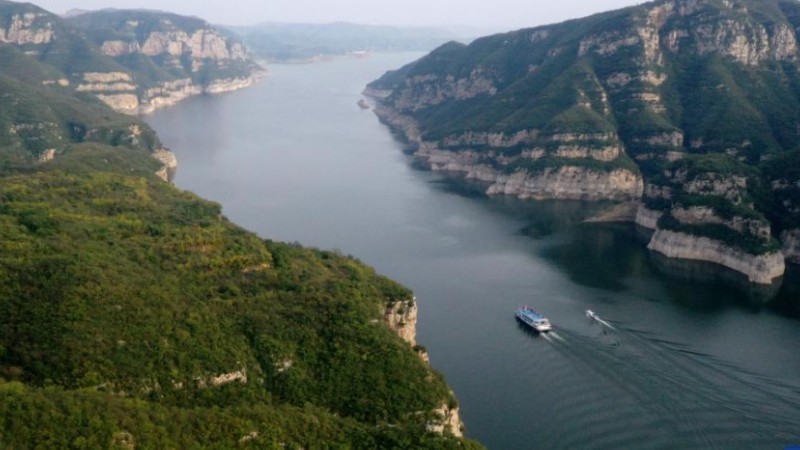China urges Israel to avoid collective punishment as Gaza humanitarian crisis grows

Smoke billows following an Israeli airstrike in Gaza City, on Oct. 12, 2023. Israel on Thursday continued its airstrikes on various areas of the Gaza Strip. (Photo: Xinhua)
The humanitarian crisis has been further aggravating in the Gaza Strip over the weekend. With Israel further pressing on Sunday with preparations for a ground offensive after having ordered more than 1 million residents to evacuate from northern Gaza, there have been growing calls for protecting civilians and acting in line with the international laws amid the escalating Israel-Palestine tensions. Among them, China said Israel's actions go beyond self-defense, urging it to avoid collective punishment of the Gaza people.
Chinese Foreign Minister Wang Yi had a phone conversation with Iran's Minister of Foreign Affairs Hossein Amir-Abdollahian on Sunday. During the call Wang said the immediate priority is to de-escalate the situation and prevent a severe humanitarian crisis in the Gaza Strip, which could result in more innocent civilian casualties and further damages to regional peace.
The exercise of the right to self-defense should comply with international law and international humanitarian law, including ensuring the safety of civilians and detained individuals. Responding to violence with violence will only cause greater harm and bring about a more serious crisis, said Wang.
In his phone call with Saudi Foreign Minister Prince Faisal bin Farhan Al Saud on Saturday, Wang said China opposes and condemns all acts that harm civilians, as they violate basic human conscience and the fundamental principles of international law.
Israel's actions go beyond the scope of self-defense. It should heed the calls of the international community and the UN Secretary-General and avoid collective punishment of the people of Gaza, Wang said.
Wang also had a phone conversation about the Israel-Palestine conflicts with Turkish Foreign Minister Hakan Fidan on Sunday night.
The death toll in the Gaza Strip climbed, with 2,329 Palestinians dead and 9,714 injured on Sunday morning, according to Gaza's health ministry, making it the deadliest Gaza war for Palestinians to date, French news outlet France 24 reported.
Israel has warned around 1.1 million Gazans living in the north of the Palestinian territory to flee to the south ahead of a ground incursion which the military has indicated will focus on the Gaza City, the base of the leadership of the Hamas militant group, according to media reports.
Such warning has sparked a huge opposition from the global community. UN Secretary-General Antonio Guterres warned on Friday that the relocation of Gaza residents from the north to the south "is extremely dangerous - and in some cases, simply not possible."
In a press conference following his visit to China, EU foreign policy chief Josep Borrellcalled Israel's order "something impossible," saying that the EU certainly defend the rights of Israel to defend itself but there is a limit, which is the international law.
Some Chinese experts believe that the Israel-Palestine conflicts is now at a critical point. If Israel continues with its planned ground offensive when Gaza has already been facing a growing humanitarian crisis, such actions clearly go against the international law and will draw much diplomatic and public opinion pressure on Israel. Meanwhile, a prolonged war would also negatively impact the process of Israel's normalization relations with Arab countries.
Growing concerns
According to the latest satellite images obtained by Global Times reporters from the International Research Center of Big Data for Sustainable Development Goals (SDG Center) on Saturday, the Gaza Strip, one of the most densely populated areas in the world, is almost completely plunged into darkness at night due to Israel's power supply cutoff.
This is in stark contrast to the previously well-lit nights in the region, highlighting the difficult living conditions faced by the residents in the Gaza Strip.
The UN refugee agency for Palestinians said on Saturday that water has now become a "matter of life and death" for people in the Gaza Strip after Israel cut their water supplies, Al Jazeera reported. More than 2 million people are now at risk as water runs out.
As Israel initiated blockades and bombings against the civilians in Gaza, international public opinion has been shifting toward sympathy for Israel to criticizing it. For instance, Croatian President Zoran Milanovi said he doesn't sympathize with Israel because of its reprisal actions in Gaza after Hamas attacks on October 7.
"The West itself now has divided views on Israel's actions not only because of growing worries for humanitarian crisis but also the looming influx of refugees from Gaza crisis to Europe so that both the US and Europe do not hope to see Gaza crisis further expand," Liu Zhongmin, a professor at the Middle East Studies Institute of Shanghai International Studies University, told the Global Times on Sunday.
Although the US and Europe support Israel, concerning the Gaza situation, they clearly see that it's at a critical point, Liu said. He noted that ordering millions of people to evacuate clearly violates international law, and it's not an easy task for Israel to separate Hamas militants from ordinary Palestine people.
After a conflict occurs, China's consistent stance is to call for a ceasefire and engage in a dialogue to resolve the issue, rather than escalating the conflict, experts said.
In the long run, continued conflict won't do good for Israel, as it would result in more civilian casualties and humanitarian crises, leading to increased huge pressure from the international community. Many countries may change their perspectives on the issue, Li Weijian, vice president of the Chinese Association of Middle East Studies, told the Global Times on Sunday.
China recognizes this, which is why China is urging Israel to agree to a cease-fire, Li noted. "Continued conflict would also negatively impact the process of Israel's normalization of relations with Arab countries, as the latter may adopt a more hostile policy toward Israel or halt the progress in improving relations. This is certainly not what Israel wants."
Saudi Arabia is putting US-backed plans to normalize ties with Israel on ice, Reuters reported on Friday, citing two sources familiar with Riyadh's thinking. This also signaled a rapid rethinking of its foreign policy priorities as war escalates between Israel and Palestinian group Hamas, according to the media report.
At this point, international powers are gradually focusing on how to resolve the issue, the Chinese expert noted.
Role of major powers
While US Secretary of State Antony Blinken was busy meeting the leaders in the Middle East in the past few days, the US was planning to send a second aircraft carrier strike group to the eastern Mediterranean, the US defense secretary confirmed on Saturday saying it is "to deter hostile actions against Israel or any efforts toward widening this war following Hamas's attack."
In his phone call with Blinken on Saturday, China's top diplomat Wang Yi said major powers should adhere to objectivity and impartiality, maintain calm and restraint and take the lead in abiding by international law.
On the escalating Palestine-Israel crisis, the effectiveness of the collective security mechanism of the major UN nations has been limited, and a major issue is that the US has been "moving far away" from the "two-state solution," Liu noted.
"Now it has been enhancing its military pressure, which, on one hand, aims to make deterrence to anti-Israel and anti-US forces such as Hezbollah in Lebanon but on the other hand, it may further provoke those forces," he said.
Zhai Jun, special envoy of the Chinese government on the Middle East issue, said he will travel to the relevant countries in the Middle East next week, further strengthen coordination with all parties, aiming to cease fire, protect civilians, ease the situation and promote peace talks, Zhai said in an interview with China Central Television aired on Sunday.
Both China and the US are influential major powers, and both have the potential to influence other countries' positions. "For example, the US may exert influence on many European countries. If the US changes its stance, those countries may follow suit," Li said, noting that the US can also work on Israel because Israel does not want to remain trapped in the conflict indefinitely.
China can also work with more Arab countries because China's position on the Palestinian issue aligns with that of Arab countries, he said. "Eventually, with the joint efforts of the international community, including China and the US, a cease-fire could be achieved."
Photos
Related Stories
- Palestinian-Israeli conflict: China calls for an early end to the violence and condemn actions against civilians
- China stands on side of peace, justice, human conscience on Palestinian issue : FM
- PM urges efforts to prevent Lebanon from going to war with Israel
- Humanitarian crisis in Gaza worsens as conflict intensifies
- Chinese envoy urges immediate ceasefire between Palestine, Israel
Copyright © 2023 People's Daily Online. All Rights Reserved.









